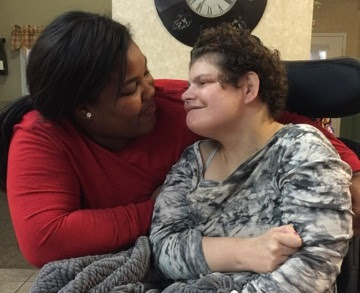Talking without talking
- A
- A
- A
 By Torey Richardson, health support professional
By Torey Richardson, health support professional
Working at HCS has put numerous things into perspective, but most importantly made me realize how blessed I truly am. Often times we take the simplest things for granted without giving it much thought. Imagine not being able to verbally communicate your wants and needs — and imagine the communication barrier that can create.
While many people are fortunate to have friends or family call and visit or even go home for the holidays, others for various reasons are not as fortunate. This is why forming relationships with the people who choose our services, and also helping foster relationships is crucial. By making these connections we are able to better support individuals by not only learning how they communicate, but also teaching others how to communicate with them. This results in limitless possibilities. Individuals are able to join groups within their communities, socialize with their neighbors, and much more. I believe it is our responsibility to change the stigma that ignorantly implies that if a person cannot verbally communicate, then they cannot communicate at all. There is so much that we can learn from each other, if we know how and if we are willing to try.
For people recently hired and for people interested in getting to know someone who communicates differently, there are many options to help you be successful:
- Find out what the person likes. It is always easy to engage someone in a conversation about common interests.
- Learn American Sign Language or other ways of communicating. (Heritage Christian offers classes that teach staff how to use sign language.)
- Ask senior staff. They were once in the position that you may be in, finding it difficult to communicate with someone. They may have useful tips that can help.
- AND GIVE IT TIME! A lot of the individuals that we support see many different staff members come and go. The person may just be shy so give it time and eventually they may come around.